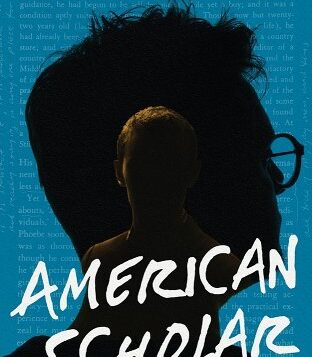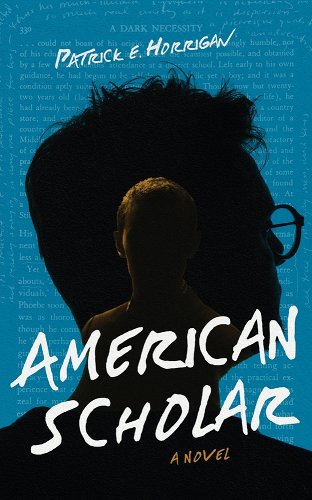STORIES ABOUT gay male scholars in different eras can reveal intriguing contrasts. What did it mean to be a man, an American, a scholar, and a closeted “invert” in the 1920s? What did it mean to join an all-male “Gay Study Group” at Columbia University in the 1980s, when a life of art and ideas could be interrupted at any time by a sexually transmitted virus that destroyed the body’s ability to protect itself? Has the current legal status of same-sex marriage allowed gay men to join the cultural mainstream in the 21st century?
In Patrick E. Horrigan’s American Scholar, questions are raised and addressed in a narrative about James Fitzgerald, called “Jimmy” in his youth. The reader first meets him in 2016, when he is unwilling to dispose of twelve storage boxes that contain “all that is left” of the life he had with Gregory in the 1980s. Like many middle-class heterosexual couples, James and his current husband are in conflict about whether to bring a child into their lives, even though they could afford it. Like the author, James seems introspective, genteel, academic, and literary. His life just before Trump is elected is undoubtedly privileged, yet he carries scars from the past.
In a chapter set in 1987, we meet the lively group of gay male students at Columbia University that became Jimmy’s chosen family. He has one foot in the real world of 1980s urban American culture and the other in the philosophical, closeted world of F. O. Matthiessen (1902–1950), a scholar in an earlier era who explored the work of 19th-century American authors Emerson, Thoreau, Hawthorne, Melville, and Whitman in a study published in 1941. Jimmy is writing a Ph.D. thesis on Matthiesen, which means that he is tackling, secondhand, a literary world in which Americans were still searching for a national identity. More exciting for Jimmy is Matthiesen’s relationship with his long-term companion Russell Cheney, who apparently inspired him.
Jimmy’s life as a graduate student is vividly relatable. Both the tedium of spending hours reading about dead men and the excitement of finding unexpected treasure are convincingly described. When not reading and taking notes, Jimmy strikes up a tentative connection with Gregory, who cofounded the study group with Bill but who now seems to be single.
Subsequent chapters alternate between 2016 and 1987. It is Gregory who renames Jimmy as “James,” and it sticks. James learns about popular music and cooking from Gregory, whose knowledge is impressive but whose behavior can be extreme. Gregory warns James that he has bipolar disorder and is subject to suicidal depression, and James is moved by his honesty. Like anyone, James has no way of predicting what a relationship with a mentally ill partner will be like. He learns, painfully, that every human consciousness is an island, and there are some places where he cannot follow his lover, his friends, or his role models.
James’ book, also called American Scholar, reaches a receptive audience, yet its launch is accompanied by disappointment. Just as James refused to attend Bill’s funeral, obsessively organized by Gregory after Bill’s death from AIDS in 1987, James’ current husband Fran stays away from James’ reading in 2016. A mysterious envelope with James’ name on it, given to him by Gregory’s sister after his death, is a source of suspense until James opens it and learns that Gregory is still capable of surprising him from beyond the grave.
Like a big, satisfying 19th-century novel, this book about another book which doesn’t actually exist is full of deft character sketches, vivid descriptions of particular places, and little epiphanies. James’ sex life is parallel to his research: exhilarating in peak moments, but subtly disappointing when intimacy cannot be reached or maintained. American Scholar—the actual novel by Patrick Horrigan, which won Next Generation Indie Book Award for lgbtq+ fiction for 2023—is an honest and endearing look at two contrasting times and places.
____________________________________________________







